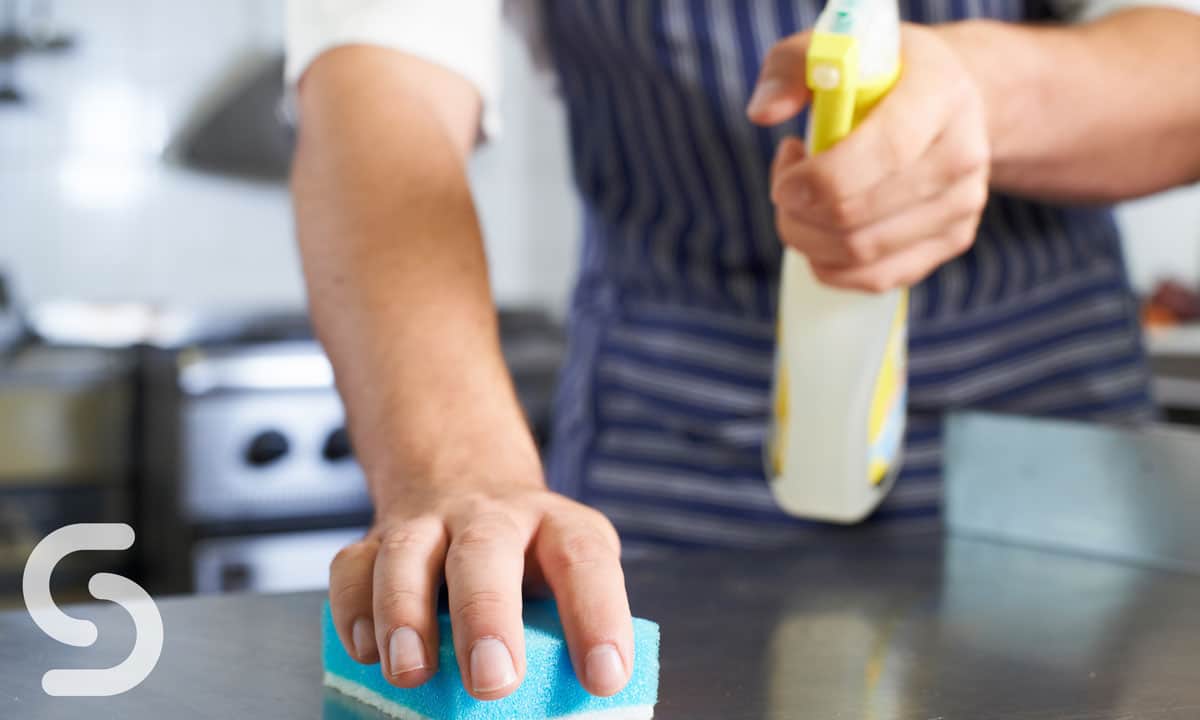Menu Covers: First Impressions Count In Defining Your Customer’s Dining Experience
A menu cover is your first opportunity to connect with your customer. In this article, we’ll guide you through creating
A menu cover is your first opportunity to connect with your customer. In this article, we’ll guide you through creating
Maintaining the highest standards of food quality, taste, and safety is crucial in the dynamic world of hospitality and culinary
Champagne is often associated with celebrations and special occasions, and for good reason.
When it comes to crafting the perfect cup of coffee, every detail matters. From the quality of the beans to
In hospitality, especially in food-based businesses like restaurants and catering, cleaning and sanitation are paramount. Keeping a clean kitchen is crucial for health, safety, efficiency, and the business’s reputation. Regular and intensive weekly deep cleaning is vital for a sanitary and efficient workspace.

Commercial kitchen cleaning procedures are crucial for upholding cleanliness and preventing germ spread. This includes regular cleaning of surfaces, cooking equipment, and floors using appropriate tools and chemicals. Using colour-coded cleaning equipment is a standard practice in these procedures, as it helps prevent cross-contamination between different areas of the kitchen and other parts of the restaurant. For instance, separate mops and cloths are used for food preparation areas, dining spaces, and bathrooms.
Critical daily tasks include wiping surfaces with soapy water, rinsing, drying to remove food residues, and clearing grease traps. Cleaning high-touch areas like door handles and appliance controls with disinfectants and emphasising staff hygiene, like frequent handwashing, are also critical.
Cleaning maintains basic hygiene, but deep cleaning tackles areas not covered daily. This involves cleaning every part of the kitchen, including hard-to-reach places like oven interiors and behind appliances.
Deep cleaning includes dismantling cooking gear to remove grease and food debris, cleaning extraction systems to prevent grease fire risks, and scrubbing floors to eliminate persistent residues. Special attention is paid to food preparation surfaces during the deep clean process. These areas require meticulous cleaning to prevent food poisoning and to ensure that all surfaces that come into contact with food are hygienic and safe.
Hot water in cleaning is crucial as it helps dissolve grease and food residues more effectively. Combined with appropriate cleaning agents, it thoroughly sanitises the surfaces. This deep cleaning is not only about maintaining appearances but is crucial for the health and safety of both the staff working in the kitchen and the patrons dining in the restaurant.
Weekly deep cleaning schedules, conducted by professional kitchen deep cleaning services, ensure that these high standards of cleanliness and hygiene are consistently met, safeguarding against health risks like food poisoning and contributing to the overall quality and reputation of the restaurant.
Using specialised cleaning equipment and chemicals can make cleaning more efficient and effective. High-quality degreasers for grease removal and specific floor cleaning solutions are essential. Proper dilution of cleaning chemicals and warm water are vital for optimal cleaning. Regularly cleaning appliances like coffee machines and refrigerators is necessary to prevent bacterial buildup.
Ignoring cleaning and sanitation in a kitchen can lead to serious health risks, including foodborne illnesses. A clean kitchen is not just a legal requirement; it builds customer trust and protects the business’s reputation. Regular and thorough cleaning minimises contamination risks and germ spread.
Also, a clean kitchen creates a better work environment, potentially improving staff productivity and morale. Following cleaning standards is a crucial part of due diligence for food businesses.
Chef uniforms should be cleaned regularly to maintain hygiene and a professional appearance. Start by separating them from your regular laundry to prevent cross-contamination. Treat stains using a stain remover, baking soda, and water mixture before washing them. Check the care label for specific washing instructions, but in general, use cold or lukewarm water and a mild detergent. Avoid bleach, as it can weaken the fabric.
It ensures the safety of staff and customers, enhances the work environment, and maintains the business’s reputation. Investing in proper cleaning solutions, equipment, and professional services is beneficial for safety, efficiency, and sustainability in the competitive world of food and hospitality.
To read more about food safety, check out our blog on effective food storage and temperature checks.



A Company Registered in England & Wales Company Registration Number: GB05069286 VAT Registration Number: GB867112521 Smart Hospitality Supplies is a trading division of The Smart Marketing & Media Group Limited
